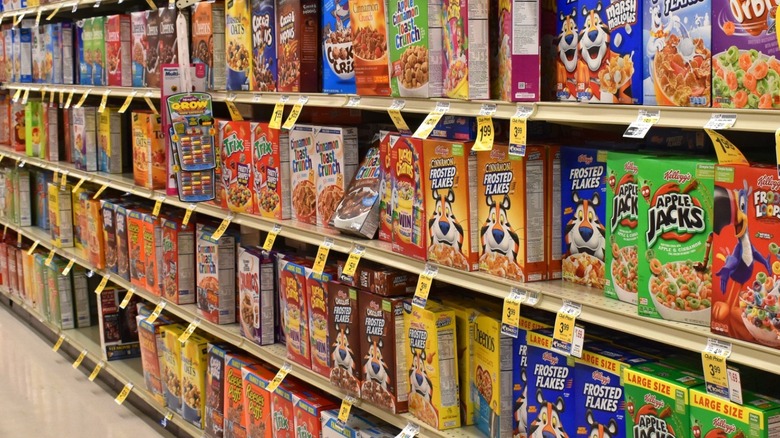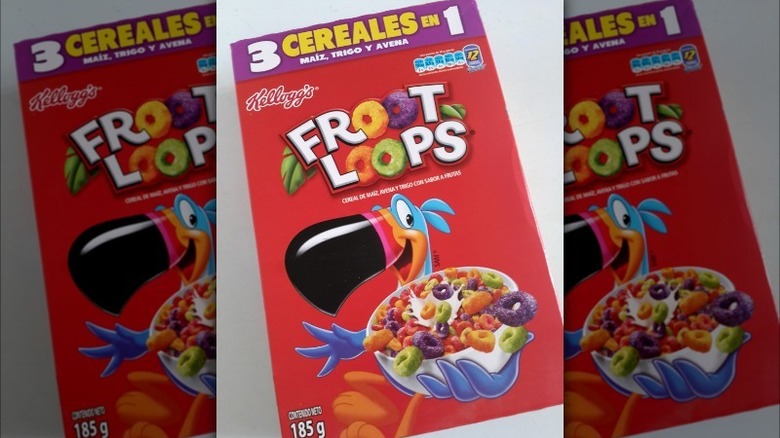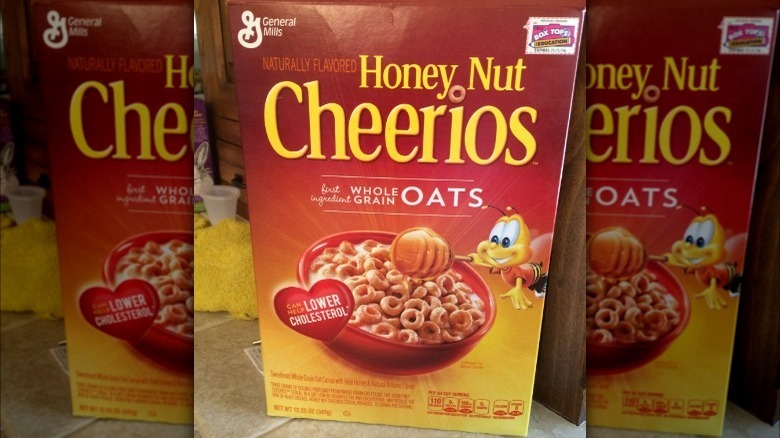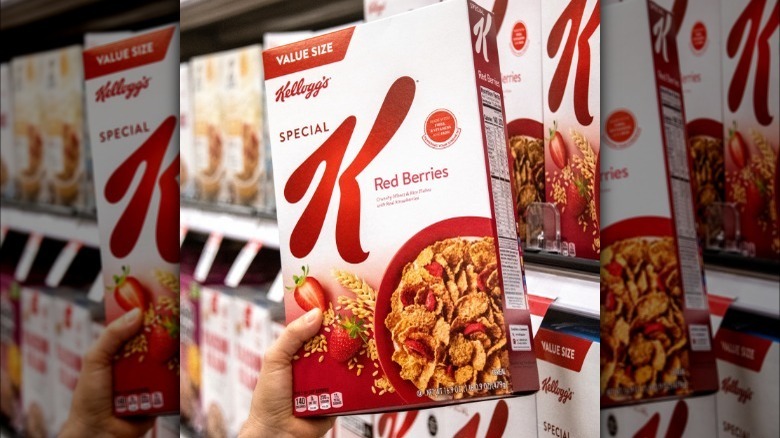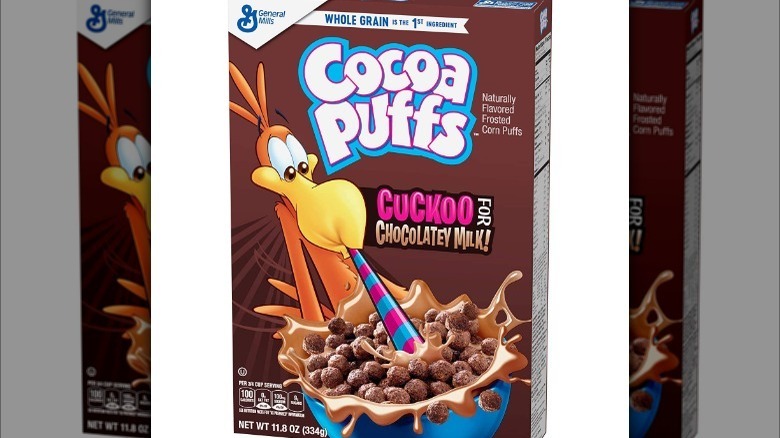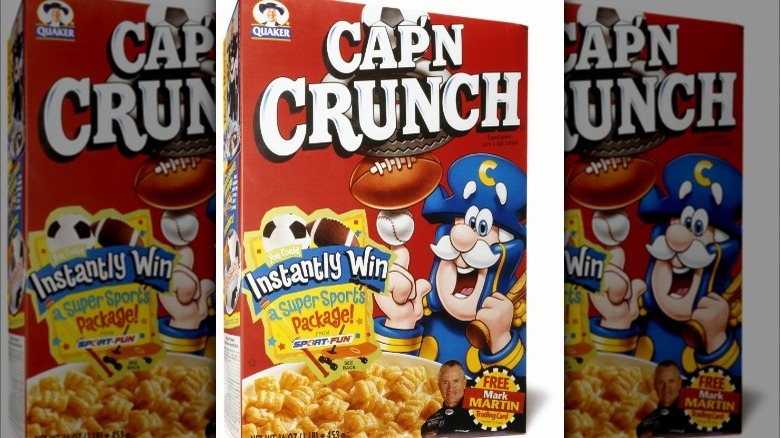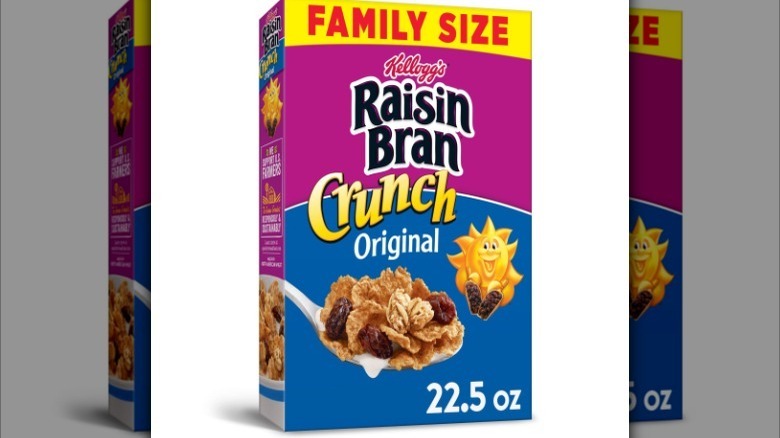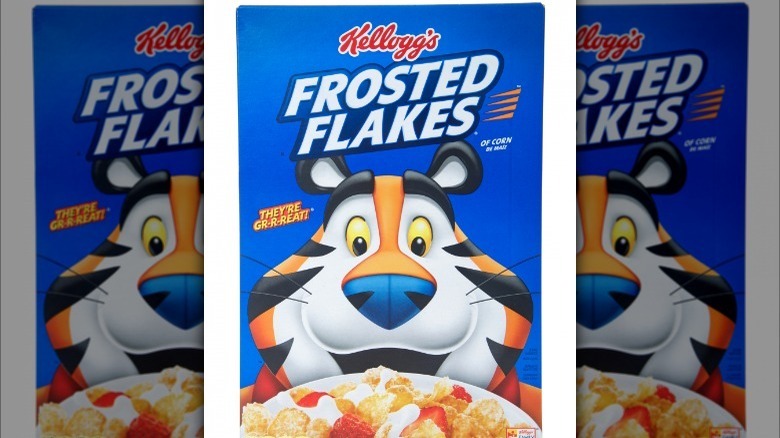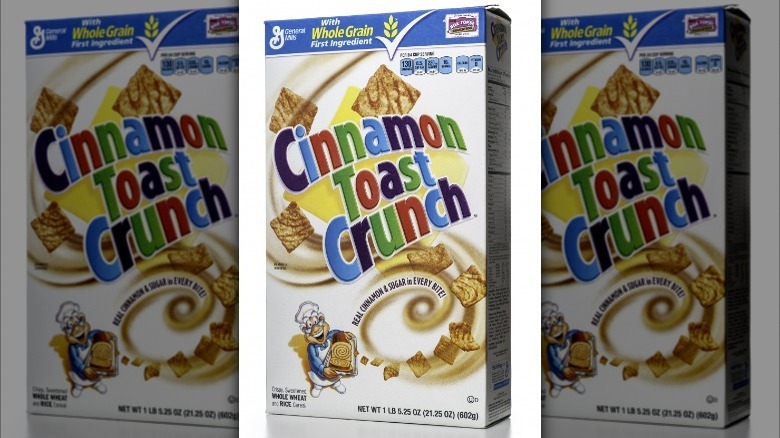10 Cereals You Might Want To Avoid Eating
Cereals hold a cherished place in the hearts and pantries of many, transcending their traditional breakfast role to become an anytime delight. People across the nation embrace it beyond the confines of their morning routines, making it an important topic of discussion. The ubiquity of cereal consumption underscores the significance of understanding the potential health pitfalls associated with certain kinds. From seemingly virtuous whole-grain claims to enticing flavors marketed toward children and adults alike, cereals have a way of masking their true nutritional profiles. Even after the FDA has redefined the standards of "healthy" cereal according to CNBC, many have undeservingly passed the mark.
As we delve deeper into this topic, it becomes evident that some breakfast cereals, despite their innocent appearance, are laden with sugars, unhealthy fats, and artificial additives. A critical examination of the nutrition labels and ingredient lists becomes imperative in making informed choices for our well-being. By shining a light on these 10 cereals you might want to avoid eating, we hope to empower you with the knowledge needed to navigate the colorful and often misleading world of cereals.
1. Froot Loops
"Follow your nose, it always knows," the famous tagline for Froot Loops, may lead you to the cereal aisle, but beware of its colorful deception. Froot Loops are packed with added sugars, and other unhealthy, chemical additives for coloring and preservation like yellow 5, blue 1, and BHT, making them a less-than-ideal choice for a nutritious breakfast. This saccharine-laden cereal can lead to various health issues, despite the illusion of a fun and vibrant morning meal.
One glance at the SmartLabel from Kellogg's reveals the stark truth about Froot Loops' nutritional content. Although the packaging may boast essential vitamins, none reach above 25% of the recommended daily value. In addition, a single serving contains 12 grams of sugars, or 24% percent of the recommended daily value of added sugars. However, according to a study published in the Journal of the American College of Nutrition, adults eat about 200% of recommended cereal serving sizes. The benefit of the vitamins is surely negated by the large amounts of added sugars, which can cause blood sugar levels to spike and plummet, leaving you feeling lethargic and unsatisfied.
The New York Times warns "Froot Loops may boast a rainbow of colors and a tempting sweetness, but underneath lies a concerning reality — an alarming amount of added sugars." These sugary rings can lead to a host of health issues, such as obesity, diabetes, and dental problems, making Froot Loops a concerning choice for daily consumption.
2. Honey Nut Cheerios
Honey Nut Cheerios seem like the perfect breakfast cereal for a discerning child (or yourself), salvaging some aspects of health while maintaining its sweet allure. However, despite its reputation as a healthier choice, these honey-kissed loops may reveal something you didn't know about cereal. It contains 12 grams of added sugars, 210 milligrams of sodium, and 2 grams of fat per serving, but most importantly — a potentially dangerous ingredient called tripotassium phosphate.
While tripotassium phosphate is used for preserving various foods, it is also used (at different levels) in paint and cleaning products. As a rule of thumb, it is generally wise to avoid ingesting any ingredients that are also used in commercial cleaning products. Although the FDA deems it safe at low levels, there has been much debate. The National Kidney Foundation has linked high levels of phosphorus, like those found in tripotassium phosphate, to an increased risk of heart attack and stroke, as well as direct damage to the kidneys resulting in loss of function, and eventually kidney failure.
A bowl of Honey Nut Cheerios might appear wholesome and heartwarming, but appearances can be deceiving. Even as the FDA proposed new criteria for what qualifies as "healthy," Honey Nut Cheerios failed to meet the revised standards.
3. Kellogg's Special K Red Berries
Aiming for a health-conscious breakfast, many individuals turn to Special K Red Berries. However, the reality is that this cereal might not be as virtuous as it portrays itself. Disguised by the temptation of those sweet red berries is a cereal packed with sugar, refined grains, and carbohydrates. A closer look at the nutritional information reveals that Special K Red Berries may not be the intelligent choice it claims to be. Despite its reputation as a diet-friendly option, the cereal has 11 grams of sugar and 34 grams of carbohydrates.
According to the New Jersey Bariatric Center, when choosing a cereal, the ideal amount of carbs per serving is 15 grams, and little to no added sugars. That makes one serving of Special K Red Berries a poor choice, with over half of that amount, and 10 of its 11 grams of sugars being added sugars. Further inspection of the nutritional content brings to light some concerns beyond sugar.
A study by Brentnall in The Allamakee Journal highlights Special K Red Berries' use of refined grains, which lack essential nutrients, and fiber, as they have undergone processing that removes the nutrient-rich bran and germ our bodies need. Consuming foods high in refined grains can lead to rapid spikes in blood sugar levels. The healthiest choices are cereals that prioritize whole, nutrient-dense ingredients over processed grains and added sugars.
4. Granola cereals
Regarded by many as a go-to health food, granola often presents itself as a health-conscious choice, but granola-based cereals often harbor unhealthy fats and sugars that can be detrimental to your health. According to WebMD, granola's reputation as a nutritious option has led to an overconsumption of calories by those seeking healthier alternatives. On average, one serving size of granola can contain up to 40 grams of carbohydrates, 14 grams of sugar, 3 grams of fat, and 1 gram of saturated fat.
A major reason that granola cereals are not as healthy as we think lies in the preparation of the granola. According to a report by Healthline, granola is made with fatty oils like coconut or vegetable oil, and nut butters to bind it, add flavor, and aid in the toasting process. This adds significantly more calories, fat, and sugar, which when eaten in excess (as cereal often is), can increase your risk of metabolic disease and obesity, as well as type 2 diabetes, heart disease, and dental issues.
While it may not apply to all granola cereals, one final thing to consider is the presence of extra ingredients. Typically, granola cereals contain a variety of additives, such as honey, added sugar, chocolate chips, and dried fruits. Granola already has enough sugar due to its preparation — it does not need any more. Always be sure to check the nutritional values and ingredients before choosing your cereal; never assume anything.
5. Cocoa Puffs
Indulging in the chocolaty delight of Cocoa Puffs may provide momentary pleasure. However, going "Cuckoo for Cocoa Puffs" is not as fun as it sounds, and can have alarming long-term impacts on your health. One serving contains 1.5 grams of fat, 9 grams of sugar, and 12 grams of "other carbohydrates" (starches and sweeteners). Essentially, these companies hide extra sugar by deceptively listing them as other carbohydrates or in the ingredients, like honey.
As reported in Science News, the high sugar content in Cocoa Puffs contributes to rapid spikes in blood sugar levels, causing a surge in insulin production. However, this sudden insulin response is followed by a sharp drop in blood sugar levels, leaving you feeling exhausted and hungry soon after consumption. The continuous cycle of blood sugar fluctuations can lead to insulin resistance over time, a condition where cells become less responsive to insulin, potentially increasing the risk of type-2 diabetes. The high glycemic index of Cocoa Puffs can also impact overall metabolic health. The rapid increases in blood sugar levels caused by foods with a high glycemic index can lead to weight gain and an increased risk of obesity-related conditions.
Moreover, a study by Brentnall in The Allamakee Journal shows that Cocoa Puffs contain artificial additives and harmful phosphates. These additives, such as artificial colors, flavors, and sweeteners (like "other carbohydrates"), can adversely affect your long-term health. For some individuals, they may trigger allergies or sensitivities, further exacerbating potential health issues.
6. Cap'n Crunch
Ahoy there! While the sugary delight of Cap'n Crunch might be tempting, a closer look at the cereal's nutritional content raises red flags about its impact on your health. In addition to 2 grams of fat, 1/2 gram of saturated fat, 33 grams of carbohydrates, and 17 grams of added sugars, the cereal also contains harmful preservatives that can have serious effects on your long-term health.
The unhealthy fats in Cap'n Crunch can potentially sabotage your cardiovascular well-being. According to Healthline, regular consumption of foods high in saturated fats, as found in Cap'n Crunch, can lead to elevated levels of LDL cholesterol, commonly known as "bad" cholesterol. High LDL cholesterol levels are associated with an increased risk of heart disease and other cardiovascular issues, making it crucial to be mindful of your saturated fat intake.
In addition to saturated fats, Cap'n Crunch contains an ingredient called butylated hydroxytoluene (BHT). According to the Restorative Medicine Library, BHT is a synthetic antioxidant used as a preservative in certain food products. While the FDA has approved BHT for use in food, some studies have raised concerns about its potential adverse health effects. Research suggests that BHT may have harmful effects on the liver and thyroid function. Moreover, there have been concerns about its potential to act as an endocrine disruptor, interfering with hormonal balance in the body.
7. Kellogg's Raisin Bran Crunch
While Raisin Bran Crunch may appear to be a nutritious choice for breakfast, several aspects of this cereal raise concerns about its overall nutritiousness. One serving contains 1 gram of fat, 46 grams of carbohydrates, and 19 total grams of sugar (13 of which are added).
One area of concern lies in the refined grains present in Raisin Bran Crunch. Refined grains, as opposed to whole grains, lack essential nutrients and fiber as they have been processed, removing the nutrient-rich bran and germ. In addition, there is such a large amount of added sugars that a tiny serving of this cereal provides you with half of your daily value recommended by Health.gov in the 2015-2020 dietary guidelines. The combination of high sugar and carbohydrate consumption can lead to heart disease, diabetes, weight gain, and even certain cancers.
Moreover, despite its association with raisins, Raisin Bran Crunch may not be as nutrient-dense as one would hope. The nutritional information provided by Kellogg's indicates that while the cereal contains raisins, it also has added sugars and other ingredients that may overshadow the dietary benefits of the dried fruit, which in and of itself is a source of sugar.
The cherry on this unhealthy sundae is the overwhelming lack of added vitamins that many other cereals boast in order to distract from their true nutritional values. It contains no vitamin C or D; the only notable nutrient in Raisin Bran Crunch is manganese.
8. Kellogg's Frosted Flakes
Frosted Flakes, endorsed by the charismatic Tony the Tiger, has long been a breakfast favorite among the young and old. The alluring promise of sweet, frosted cornflakes may be a delightful way to start the day, but the truth beneath the surface reveals a sugary trap that demands our attention. Regular consumption of Frosted Flakes can lead to elevated insulin levels, increasing the risk of insulin resistance, and type 2 diabetes.
Amidst a landscape where the FDA has redefined what qualifies as healthy, Frosted Flakes did not meet the revised standards. This raises a red flag about its nutritional profile, which may contain excessive sugars and questionable additives. The added sugars in Frosted Flakes provide empty calories and lack essential nutrients, making them a less-than-optimal choice for a balanced diet.
It also includes ferric phosphate, an iron phosphate or fortifying additive that, according to the National Pesticide Information Center, is also used in many pesticides and only found naturally in soil. This means it is yet another synthetic additive to the cereal; and although the FDA considers it "Generally Recognized as Safe" (GRAS), it is toxic to animals in large amounts and can also cause symptoms in humans, such as eye irritation or gastrointestinal issues.
9. Cinnamon Toast Crunch
Cinnamon Toast Crunch, a breakfast classic cherished by generations, holds a special place in the hearts of many. The mere mention of its name evokes a sense of nostalgia, transporting us back to carefree mornings spent munching on those irresistible squares. However, upon examining its ingredient list, a troubling revelation regarding this cereal comes to light. One serving contains 4 grams of fat, 12 grams of added sugars, and trisodium phosphate. However, this revelation centers on one specific ingredient that requires careful consideration — butylated hydroxytoluene (BHT).
Studies, like the one published in the National Center for Biotechnology Information, suggest that BHT may have potential adverse effects on human health. The study highlights that it has been associated with various health concerns, including liver and thyroid dysfunction, and may act as an endocrine disruptor, interfering with hormonal balance.
While Cinnamon Toast Crunch may boast fortifications with essential vitamins and minerals, we must navigate the trade-off between perceived benefits and the shadow of artificiality that lingers. Understanding the presence of artificial flavors and the implications of high sugar and refined grains allows us to approach this beloved cereal with eyes wide open.
10. Lucky Charms
Lucky Charms, adorned with charming marshmallow shapes, seem like a fun and whimsical choice for breakfast — they're magically delicious! However, the ingredients and artificial additives are not as magically nutritious. One serving of Lucky Charms contains 2 grams of fat, 12 grams of added sugars, and additives like trisodium phosphate, Red 40, Yellows 5 & 6, and Blue 1. A study titled "Toxicology of food dyes," published in the "International Journal of Occupational and Environmental Health," has verified that "three dyes (Red 40, Yellow 5, and Yellow 6) have been found to be contaminated with benzidine or other carcinogens," and "at least four dyes (Blue 1, Red 40, Yellow 5, and Yellow 6) cause hypersensitivity reactions."
According to an NBC News report, Lucky Charms has been subject to investigations due to reports of stomach illnesses. Moreover, Forbes highlights that from late 2021 to May 2022, the cereal received over 7,300 illness complaints on the website iwaspoisoned.com, which collects reports of food-related illnesses linked to specific products or businesses. While the exact cause of these reported illnesses is still unknown, it raises questions about the safety and potential health implications of the artificial colors and flavors used to create the iconic marshmallow shapes.
